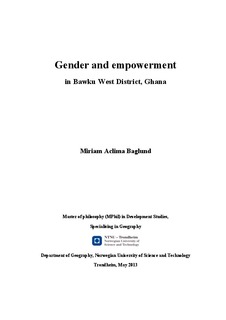Gender and empowerment in Bawku West District, Ghana
Master thesis
Permanent lenke
http://hdl.handle.net/11250/265583Utgivelsesdato
2013Metadata
Vis full innførselSamlinger
- Institutt for geografi [1097]
Sammendrag
Based on an intersubjective understanding between the researcher and the participants from Bawku West District, Ghana, this thesis examines how a local NGO that aims to empower women in terms of knowledge and access to land, has influenced the everyday life of women and men in a rural patriarchal community. The intersubjective understanding is a result of a feminist research approach focusing on subjective experiences emerging out of focus group discussions and participatory observation. The thesis assesses how empowerment and gender are understood and argues that diversity in interpretation of those concepts affects the impact of empowerment.
Through the usage of a gender lens in the field and in the analytical process, the author acknowledges that men need to be included in the process of empowering women in order to avoid a feminization of obligations and responsibilities. In order for women empowerment to strengthen the level of cooperation within families, men should be given training in reproductive skills. Empowerment needs to be looked at in relation to the existing power and emotional relations between husband and wife. Together with subjectivity, symbolic representations and institutions, gender relations are subject to both change and continuity. When it comes to bargaining patriarchy; ethnical customs and religious norms have to be looked at more carefully because they can both impede and support women empowerment.
